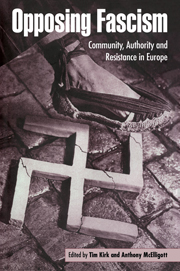Book contents
- Frontmatter
- Contents
- List of contributors
- Preface
- Introduction: Community, authority and resistance to fascism
- 1 The German revolution defeated and fascism deferred: the servicemen's revolt and social democracy at the end of the First World War, 1918–1920
- 2 Dangerous communities and conservative authority: the judiciary, Nazis and rough people, 1932–1933
- 3 The anti-fascist movement in south-east Lancashire, 1933–1940: the divergent experiences of Manchester and Nelson
- 4 Spain 1936. Resistance and revolution: the flaws in the Front
- 5 The Blueshirts in the Irish Free State, 1932–1935: the nature of socialist republican and governmental opposition
- 6 Town councils of the Nord and Pas-de-Calais region: local power, French power, German power
- 7 Structures of authority in the Greek resistance, 1941–1944
- 8 Nazi Austria: the limits of dissent
- 9 ‘Homosexual’ men in Vienna, 1938
- 10 ‘The years of consent’? Popular attitudes and forms of resistance to Fascism in Italy, 1925–1940
- 11 Saints and heroines: rewriting the history of Italian women in the Resistance
- Notes
- Index
3 - The anti-fascist movement in south-east Lancashire, 1933–1940: the divergent experiences of Manchester and Nelson
Published online by Cambridge University Press: 28 July 2009
- Frontmatter
- Contents
- List of contributors
- Preface
- Introduction: Community, authority and resistance to fascism
- 1 The German revolution defeated and fascism deferred: the servicemen's revolt and social democracy at the end of the First World War, 1918–1920
- 2 Dangerous communities and conservative authority: the judiciary, Nazis and rough people, 1932–1933
- 3 The anti-fascist movement in south-east Lancashire, 1933–1940: the divergent experiences of Manchester and Nelson
- 4 Spain 1936. Resistance and revolution: the flaws in the Front
- 5 The Blueshirts in the Irish Free State, 1932–1935: the nature of socialist republican and governmental opposition
- 6 Town councils of the Nord and Pas-de-Calais region: local power, French power, German power
- 7 Structures of authority in the Greek resistance, 1941–1944
- 8 Nazi Austria: the limits of dissent
- 9 ‘Homosexual’ men in Vienna, 1938
- 10 ‘The years of consent’? Popular attitudes and forms of resistance to Fascism in Italy, 1925–1940
- 11 Saints and heroines: rewriting the history of Italian women in the Resistance
- Notes
- Index
Summary
Most of the studies in this collection focus on those countries where fascist movements have made a major impact. This chapter is concerned with the most important British manifestation of fascism, the British Union of Fascists (BUF). I will look at the impact of the BUF, and more importantly the resistance to it, in a single region. Although fascism had a marginal impact in Britain, that is not to say that the anti-fascist struggle here was unimportant. At the least it clearly had an impact at the local level in terms of the maintenance of order, and this was coupled with efforts by certain sections of British society to maintain communal authority, as will be seen in the analysis of Jewish activism below. On a more general level the discussion raises questions about the role and direction of the liberal state in crisis.
Most studies of fascism in Britain understandably emphasise the point that any consideration of the social, economic, political or cultural characteristics of 1930s' Britain shows clearly that it would have been monumentally diffcult for a movement of the extreme right to have made significant headway. This is undoubtedly so. Indeed, in political terms alone, one significant consequence of the birth of the National Government in the summer of 1931 was the marginalising of any solutions to the crisis outside a very narrow mainstream.
- Type
- Chapter
- Information
- Opposing FascismCommunity, Authority and Resistance in Europe, pp. 48 - 62Publisher: Cambridge University PressPrint publication year: 1999
- 4
- Cited by



